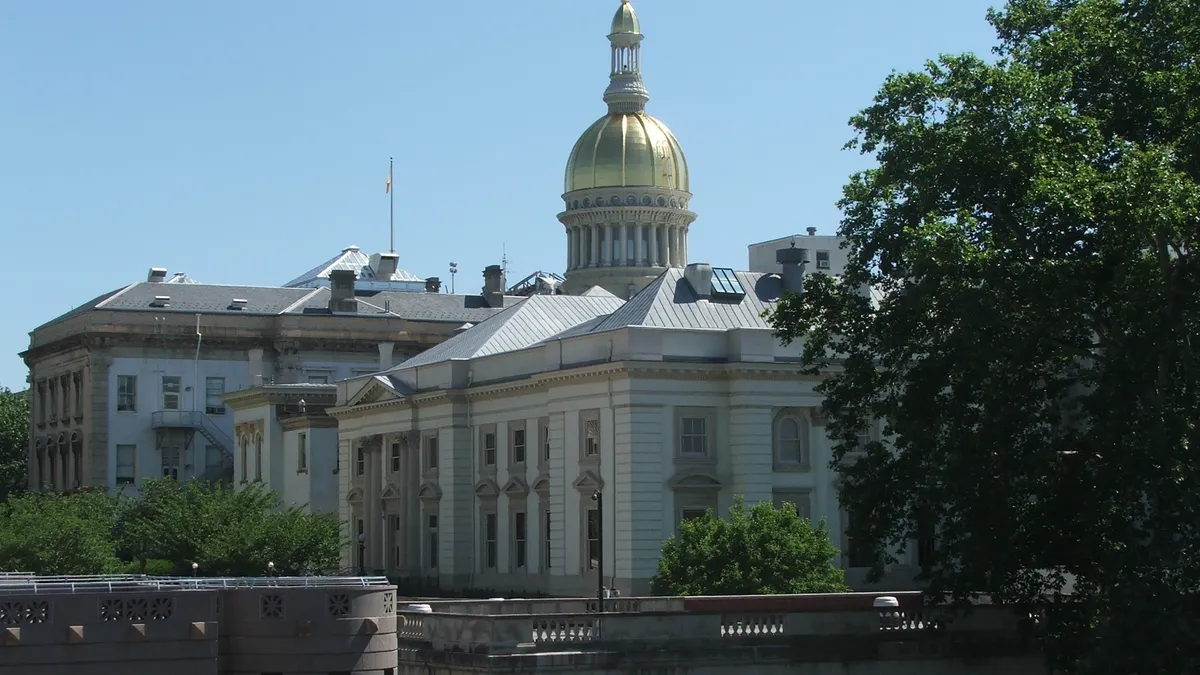Dive Brief:
-
New Jersey Democratic Gov. Phil Murphy on Wednesday signed two bills into law aimed at bolstering the state's "clean energy economy."
-
The most controversial of the bills, S-2313, establishes a Zero Emissions Certificate (ZEC) program for New Jersey's nuclear power plants.
- The other bill, A-3723, raises the target of the state's renewable portfolio standard (RPS) to 50% by 2030, establishes a 2,000 MW by 2030 target for energy storage and updates the state’s policies for offshore wind, community solar, and energy efficiency. The state's RPS was raised from 24.4% by 2028.
Dive Insight:
New Jersey on Wednesday became the most recent state to embrace the idea of 100% zero-emission energy. In addition to bills increasing the state’s RPS and establishing a ZEC, Gov. Murphy also signed Executive Order No. 28, directing state agencies to develop an updated Energy Master Plan that provides a path to 100% clean energy by 2050. But reaching that goal comes with trade-offs — namely, nuclear power.
New Jersey's new clean energy strategy is "very aggressive," particularly for a state of its size, according to Jesse Jenkins, a researcher and Ph.D. candidate at the MIT Energy Initiative.
New Jersey is the fifth smallest of the 50 states in terms of land mass, so setting a 50% RPS is an aggressive move, Jenkins told Utility Dive. The state does not have the wide open spaces for large wind farms, so much of its renewable energy either has to be imported or come from distributed solar.
If the state were to allow its nuclear plants to retire, "it wouldn't move the needle in terms of emissions or total air pollution," Jenkins said. "It would be a real tragedy from a climate point of view."
In essence, retiring the nuclear plants would create a hole that would have to be filled by new renewable resources before any meaningful increase to renewable generation levels could be achieved, he explained. As it is, the recently-approved ZEC will maintain nuclear power's current 40% contribution to the state's electrical needs in perpetuity.
"Keeping the nuclear power plants serves as a foundation for further clean energy growth and progress" and serves as a model for other states, Jenkins said. "The alternative is to run to stay in place."
Like ZECs in other states, New Jersey's ZEC could also face legal challenges. ZECs are in effect in New York and Illinois, but both await appeals court decisions.
From a legal perspective, the New Jersey law appears to be in "pretty good shape," Jenkins said. "It clearly de-links the ZEC subsidy from any wholesale power markets transactions," he said.
As a general principle, lawmakers crafting ZECs try to follow RPS programs as a model. If they price attributes like ZECs that are distinct from electricity sales, they remain within the bounds of state authority and do not infringe on federal jurisdiction. If that principle were to be challenged, "it would have serious implications for renewable energy programs across the country," Jenkins said.
"The bottom line is: If nuclear plants are shut down while they're still able to generate safe, clean and around-the-clock electricity, it will mean more air pollution, fewer jobs and higher bills," State Senate President Steve Sweeney said in a statement. "That's moving us in the wrong direction."
But that is not a point of view shared by environmentalists. "The ZEC is dreck," Jeff Tittel, director of the New Jersey Sierra Club, told Utility Dive.
"If nuclear power is maintained at 40% of New Jersey's energy mix, the state will never reach 100% renewable power; nuclear power is not renewable," Tittel said. In addition, by setting nuclear's contribution at 40%, the state will be benefiting from out-of-state nuclear resources as well, he said. Exelon's Oyster Creek nuclear plant is scheduled to retire next year, and that could leave New Jersey short of its 40% nuclear mark.
State officials, however, say the language of the bill also limits nuclear power's contribution to New Jersey's energy mix and does not allow for ZECs to be paid for partial output from a nuclear plant. It would be hard to find an out-of-state power plant to fill the gap left by Oyster Creek, but the bill allows leeway to adjust nuclear contribution.
Tittel also points to the timing of Murphy’s announcement, on the eve of the PJM Interconnection's capacity market auction. If Public Service Enterprise Group bids its two nuclear plants into the auction and they clear, it could be a public relations fiasco. They did bid and they did clear.
PSEG has said it needs the ZEC to keep its plants financially viable, but critics say the plants already earn a profit.
Tittel also criticized the state's new RPS bill, calling it a "green scam." The RPS has cost caps that will limit the actual level of renewable power that will be able to be achieved, Tittel said.
Tittel called the legislative package "a moving train wreck" and said that the legislature will likely have to revise both bills.














